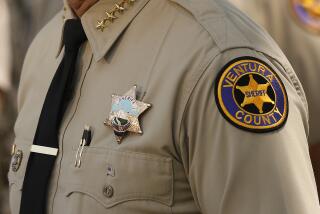ANAHEIM : ‘Fun’ Job Translates into Safety
- Share via
With two cellular phones and a guide dog by her side, Alicia Auger, a quiet 31-year-old woman, sits in her home awaiting the call for help from a stranded motorist.
Auger is an unusual one-woman mobile translator for dispatchers who monitor the 1,203 roadside emergency phones spread across Orange County’s freeways. When a stranded Spanish-speaking driver calls a California Highway Patrol operator who speaks only English, a quick conference call to the ever-vigilant Auger can knock down the language barrier.
“It’s a great job for me,” said Auger, who lost her sight in 1987 due to rheumatoid arthritis. “I really like learning all the police terms and codes. It’s a lot of fun.”
And fun in a fiscal sense for the Orange County Transportation Authority (OCTA) which had been paying a higher per-call charge to route Spanish-speaking callers to translators at the California Highway Patrol station in Monterey. Auger’s fees have worked out to a 35% savings, said OCTA special projects director Todd Murphy.
“It’s good for us, it’s good for Alicia and it’s good for the CHP,” said Murphy, who approached the Anaheim-based Braille Institute to find candidates for the job. Auger, who had been a secretary for the institute, tried out for the spot and “has done a great job,” he said.
Of the 12,000 monthly calls that come through Orange County’s 1,203 emergency phones, about 500 come from non-English speakers, Murphy said. The vast majority are Spanish.
All calls are routed to the Santa Ana CHP office where only three of the 28 operators are bilingual. The non-Spanish speakers relay their calls to Auger, Murphy said. If she is off duty, the caller is transferred to Monterey dispatchers.
But when Auger is on duty, she carries the phones with her everywhere. When she leaves home, usually for her twice weekly bus ride to UCI Medical Center, she carries one phone in her worn briefcase and the other in a purse strapped across her chest. She also packs a tape recorder to gather caller information, such as a car’s location or the name and number of the stranded motorist’s family.
In the month and a half since she has worked as a translator, Auger has helped about 300 motorists.
Many callers are naturally frightened or upset, Auger said, but some are more concerned about their vehicle’s fate.
“Sometimes the people are worried that immigration will find them if they ask for help, or if they tell us where they are,” Auger said. “I tell them all we want to do is get them off the freeway safe, to get them back home safe.”
More to Read
Sign up for Essential California
The most important California stories and recommendations in your inbox every morning.
You may occasionally receive promotional content from the Los Angeles Times.













